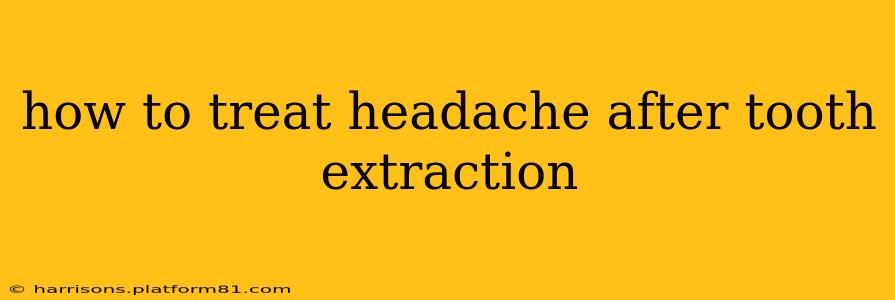A throbbing headache after a tooth extraction is a common experience, often stemming from the procedure itself or the medication used. Understanding the causes and implementing the right strategies for pain management can significantly improve your post-operative comfort. This guide offers comprehensive advice on how to treat headaches following tooth extraction.
What Causes Headaches After Tooth Extraction?
Several factors can contribute to post-extraction headaches:
- Inflammation: The surgical site naturally swells and inflames after extraction. This inflammation can put pressure on surrounding nerves and blood vessels, triggering headaches.
- Medication Side Effects: Some pain relievers, such as opioids, can cause headaches as a side effect. Non-steroidal anti-inflammatory drugs (NSAIDs) are generally preferred for post-extraction pain, but even these can occasionally lead to headaches.
- Sinus Infection (if applicable): Extractions in the upper jaw, near the sinuses, may increase the risk of sinus complications, leading to sinus headaches.
- Dry Socket: This painful complication occurs when the blood clot protecting the extraction site dislodges, exposing the underlying bone and nerve endings. This can lead to severe pain radiating to the head and causing a headache.
- Jaw Muscle Strain: The procedure itself can lead to jaw muscle strain or tension, resulting in headaches.
How to Relieve a Headache After Tooth Extraction?
Managing a headache post-extraction requires a multifaceted approach, combining over-the-counter medications with self-care strategies.
1. Over-the-Counter Pain Relief:
- Acetaminophen (Tylenol): This is generally safe and effective for mild to moderate pain and fever. Follow the recommended dosage on the packaging.
- Ibuprofen (Advil, Motrin): An NSAID that reduces pain and inflammation. It's often more effective than acetaminophen for post-extraction headaches. Follow the recommended dosage. Note: Avoid ibuprofen if you have a history of stomach ulcers or bleeding disorders.
- Combination Medications: Some over-the-counter medications combine acetaminophen and ibuprofen. These may provide broader pain relief. Always read the label carefully.
Important Note: Always consult your dentist or doctor before taking any medication, especially if you are on other medications or have pre-existing health conditions.
2. Self-Care Strategies:
- Rest: Adequate rest is crucial for healing. Avoid strenuous activities that could increase blood flow and swelling to the extraction site.
- Ice Packs: Applying ice packs to the affected area for 15-20 minutes at a time, several times a day, can help reduce swelling and pain. Never apply ice directly to the skin; always wrap it in a thin cloth.
- Elevation: Keep your head elevated while sleeping. This can help reduce swelling and pressure.
- Gentle Diet: Stick to soft foods and avoid chewing on the extraction site. This will minimize irritation and promote healing.
- Hydration: Drink plenty of fluids to stay hydrated, which assists in the healing process.
- Avoid Smoking: Smoking can significantly hinder healing and increase the risk of dry socket.
- Avoid Alcohol and Caffeine: Both can thin the blood and increase bleeding. They can also exacerbate pain and headaches.
3. When to See a Dentist or Doctor:
- Severe or persistent headache: If your headache is severe, unrelenting, or worsening, seek immediate medical attention.
- High fever: A high fever could indicate an infection.
- Signs of infection: Signs such as increased swelling, redness, pus, or foul odor from the extraction site warrant immediate professional evaluation.
- Dry socket: If you experience severe pain days after the extraction, especially if it's localized and intensified, it could indicate a dry socket. Contact your dentist immediately.
What if the headache is caused by the medication?
Some pain medications can themselves cause headaches as a side effect. If you suspect this is the case, consult your dentist or doctor. They may suggest switching to an alternative pain medication or adjusting your dosage.
What are some home remedies for a headache after tooth extraction?
While not a substitute for professional medical advice, some home remedies may offer mild relief from headache pain. These include applying a warm compress to the temples or forehead (avoiding the extraction site), practicing relaxation techniques like deep breathing or meditation, and ensuring adequate sleep.
How long should a headache last after a tooth extraction?
Most headaches after tooth extraction resolve within a few days. If your headache persists for more than a week or worsens, contact your dentist or doctor.
By following these guidelines, you can effectively manage headaches after tooth extraction and promote a smoother recovery. Remember, prompt attention to any worsening symptoms or complications is crucial for optimal healing. Always consult your dental professional with any concerns.
